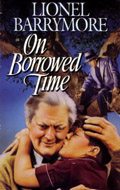| On Borrowed Time | |
|---|---|
 VHS cover | |
| Directed by | Harold S. Bucquet |
| Written by | Alice D. G. Miller Frank O'Neill |
| Based on | On Borrowed Time 1937 novel by Lawrence Edward Watkin 1938 play by Paul Osborn |
| Produced by | Sidney Franklin |
| Starring | Lionel Barrymore Sir Cedric Hardwicke Beulah Bondi |
| Cinematography | Joseph Ruttenberg |
| Edited by | George Boemler |
| Music by | Franz Waxman |
| Distributed by | Metro-Goldwyn-Mayer |
Release date |
|
Running time | 99 minutes |
| Country | United States |
| Language | English |
On Borrowed Time is a 1939 film about the role death plays in life, and how humanity cannot live without it. It is adapted from Paul Osborn's 1938 Broadway hit play. The play, based on a novel by Lawrence Edward Watkin, has been revived twice on Broadway since its original run.
The story is a retelling of a Greek fable in which Death is tricked into climbing a pear tree which had been blessed by Saint Polycarp to trap anyone who was trying to steal an old woman's pears.[1][2] The opening credits attribute the tale to Geoffrey Chaucer. "Mr. Chaucer liked the tale and believed it—and so do we. If perchance you don't believe it, we respectfully insist that we and Mr. Chaucer must be right. Because faith still performs miracles and a good deed does find its just reward." According to TCM.com,[3] this probably refers to Chaucer's "The Pardoner's Tale".
Set in small-town America, the film stars Lionel Barrymore, Beulah Bondi and Sir Cedric Hardwicke. Barrymore plays crotchety wheelchair-using Julian Northrup ("Gramps"), who smokes a smelly pipe, cherishes a smelly dog, prefers fishing to churchgoing, occasionally takes a nip of "tonic" and indulges in mild profanity. (Barrymore had broken his hip twice and was reliant on a wheelchair at the time.) Gramps and his wife, Nellie, played by Bondi, are raising their orphaned grandson, Pud, who adores his grandfather and mimics everything he does. Hardwicke plays Mr. Brink, the elegant and aloof personification of death.
- ^ The Routledge Modern Greek Reader, Η γριά κι ο Άγιος Πολύκαρπος
- ^ Ελπινίκη Σταμούλη-Σαραντή, Παραμύθια της Θράκης, Θρακικά. Σύγγραμα περιοδικόν εκδιδομένον υπό του εν Αθήναις Θρακικού Κέντρου, τόμος δέκατος έβδομος, 1942, σελ. 172–173.
- ^ "On Borrowed Time: Notes". www.tcm.com. Retrieved 2021-03-15.